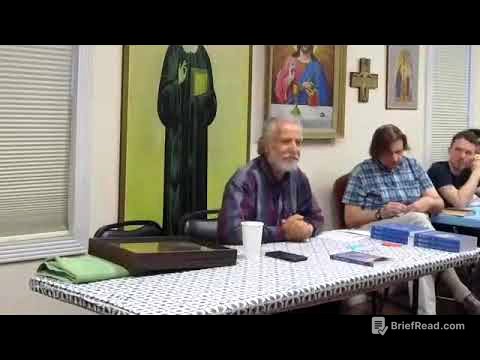TLDR;
The video discusses the call to miss Friday prayers on September 5th as a form of peaceful protest against the current regime in Egypt, advocating for presidential elections without Sisi's involvement. It also addresses the behavior and actions of individuals close to Abdel Fattah El-Sisi, such as Kamel El-Wazir, and recounts past incidents involving figures like Abbas Kamel and Ahmed Shaaban, highlighting issues of corruption, abuse of power, and the regime's treatment of dissenters. The speaker criticizes the current state of affairs, expressing disillusionment with those who support the regime and urging them to recognize the inevitable consequences of their actions.
- Peaceful protest against the Egyptian regime by missing Friday prayers on September 5th.
- Criticism of individuals close to Sisi, citing instances of corruption and abuse of power.
- Disillusionment with supporters of the regime and warnings about the consequences of their actions.
Introduction and Call to Action [0:00]
The speaker thanks the audience for their support regarding the call to miss Friday prayers on September 5th. This action is presented as a peaceful way to express dissatisfaction with the current state of Egypt and to demand fair presidential elections where Sisi is not a participant. It's framed as the initial step towards ending military rule in Egypt.
The Inner Circle of Abdel Fattah El-Sisi [0:48]
The discussion shifts to the behavior of individuals surrounding Abdel Fattah El-Sisi, specifically mentioning Kamel El-Wazir's arrogant and insulting conduct. The speaker suggests that despite public disapproval, such figures will likely remain in their positions, illustrating a lack of accountability. The speaker contrasts this with the past treatment of figures like Abbas Kamel, who, despite his involvement in corruption, faced consequences, along with Ahmed Shaaban and Mohamed Kamel.
Past Incidents and Abuse of Power [2:13]
The speaker recounts instances of officers being punished for expressing dissent or opposition views, including being fired, mistreated, and forced to resign. The speaker contrasts this with the fate of individuals like Ahmed Shaaban, Abbas Kamel, and Mohamed Kamel, who were initially powerful but later faced severe repercussions, including public humiliation and financial investigations into their private accounts outside Egypt.
Critique of Regime Supporters [5:08]
The speaker expresses pity for those who continue to support Sisi, asserting that they will inevitably face negative consequences despite their loyalty. He criticizes media figures who support the regime, warning them that they will eventually be abandoned and face severe repercussions. The speaker references past incidents as examples of how the regime treats those who were once close to it.
Warning to Committee Members and Call for Accountability [6:16]
The speaker addresses members of the regime's committees, suggesting that they will eventually be held accountable for their actions. He implies that when Sisi is trying to escape, he will sacrifice them to save himself. The speaker asserts that those who have been wronged by these committees will seek justice and hold them accountable for their actions.
Criticism of Kamel El-Wazir's Conduct and Qualifications [7:49]
The discussion returns to Kamel El-Wazir, criticizing his ill-mannered and vulgar behavior. The speaker questions his qualifications as Minister of Transportation, pointing out the poor engineering and resulting accidents on the roads he oversees. He mocks El-Wazir's reliance on his Military Technical College education as justification for his competence.
Questioning the Value of Military Education [9:13]
The speaker challenges the notion that graduating from the Military Technical College makes someone a scientist, inventor, or engineer. He questions why, if the college is so prestigious, its graduates have not won Nobel Prizes or other international awards. The speaker also points out the imprisonment of individuals who disagree with the regime, despite their education or expertise.
El-Wazir's "Fighter Spirit" and Continued Criticism [10:49]
The speaker mocks Kamel El-Wazir's claim of having a "fighter spirit," despite never having fought in a war. He criticizes El-Wazir's commitment to remaining in his position, suggesting that his true motivation is to maintain power and plunder the country. The speaker reiterates his opposition to the rule of traitors and asserts that he will continue to speak out against them, regardless of his position.
Authentic Peasants and Contemptible Class [12:14]
The speaker discusses the concept of the "authentic peasant" and contrasts them with what he considers the most contemptible class of peasants, particularly those from certain regions who hold positions in the army. He singles out the Manayefah, describing them as a "Tel Aviv Republic in Egypt" and questioning their true allegiances.
Concluding Remarks and Call to Action [14:26]
In closing, the speaker outlines six objectives for the episode, including informing viewers about the September 5th protest and encouraging them to subscribe to the channel. He reiterates the call to miss Friday prayers on September 5th as a unified action against military rule, emphasizing the importance of civilian unity.









